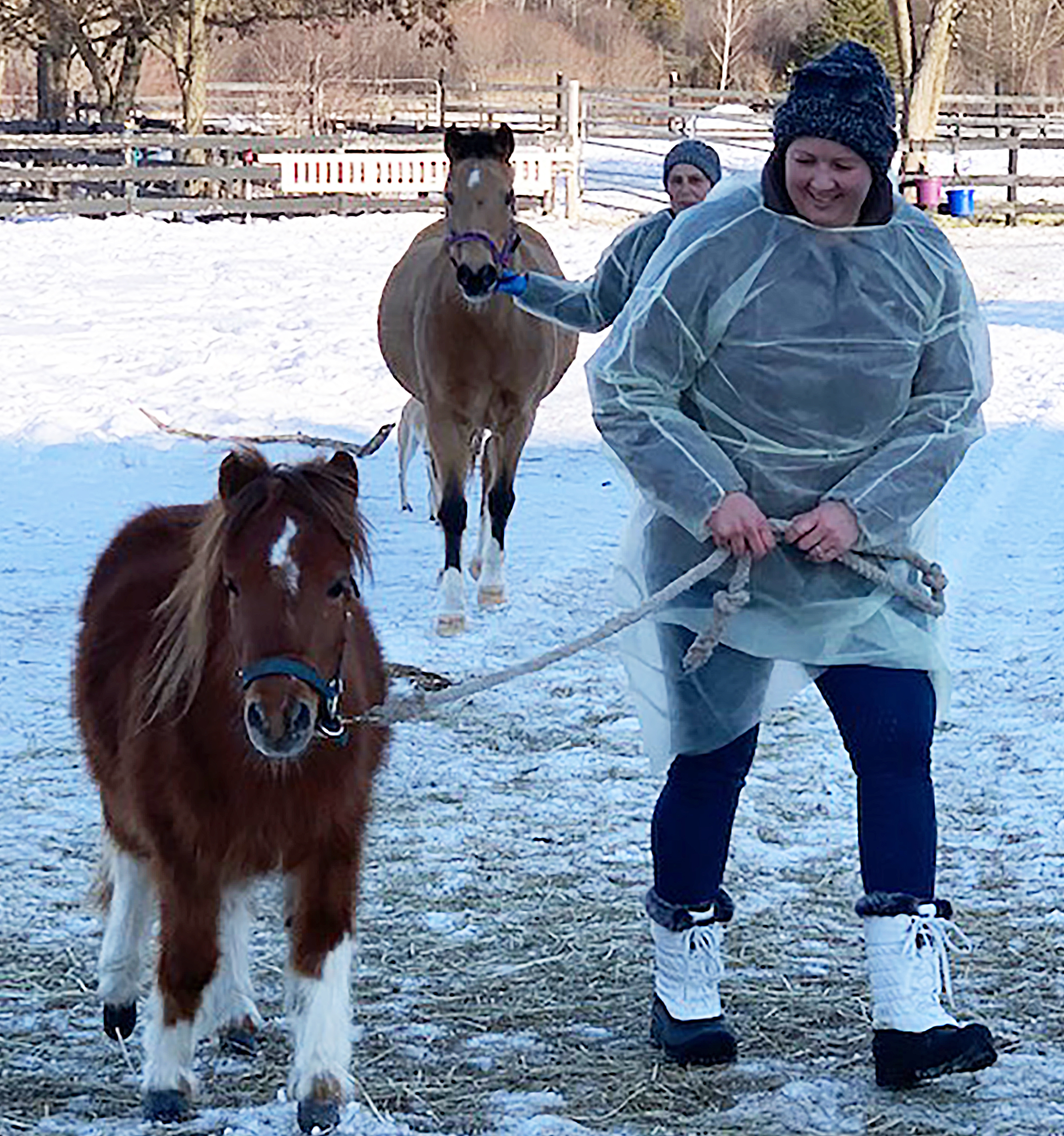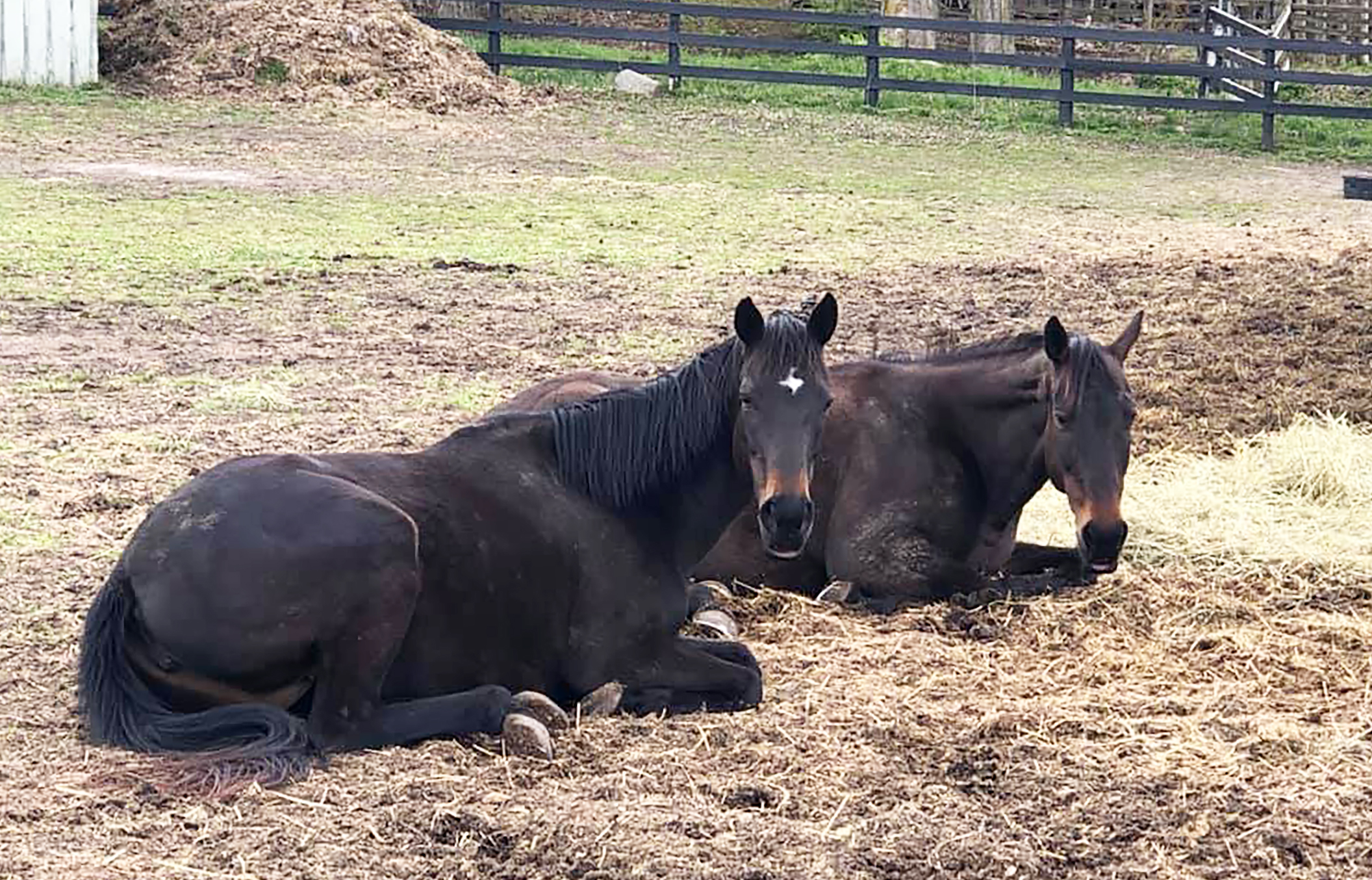PUSLINCH – Officials at Irish Creek Stables here are hopeful the worst is over after five horses died on the farm in January due to equine herpesvirus.
“It’s a bit of a nightmare,” said Melissa Laird-Arroyo, who boards a horse at the farm.
“I don’t want another one to die.”
The virus does not pose a threat to public health or food safety and there are no other reports of positive cases in the region.
All horses at Irish Creek Stables have been treated and owners are hopeful they’re reaching the end of the struggle, expressing appreciation for support from the local equine community and frustration with the response of government officials.
Dr. Scott Weese, director of the Centre for Public Health and Zoonoses and a pathobiology professor at the Ontario Veterinary College (OVC), is helping Irish Creek handle the outbreak.
The virus
Equine herpesvirus-1 (EHV-1) “is a common virus in horses,” said Weese, who works with infection control, outbreak response and disease surveillance.
He said most young horses are infected and then the virus lies dormant, before occasionally reactivating or spreading between horses, sometimes leading to abortion or neurological disease.
Weese said neurological disease is rare but sometimes severe, with “clusters on farms or tracks.”
Equine herpesvirus myeloencephalopathy (EHM) is the name of the condition EHV-1 can lead to, with severe neurological symptoms and possible death.
Liz Lewis, owner and manager of Irish Creek Stables, said for some horses symptoms are significant and hit fast, while others “had a fever and nothing much happened.
“It’s been a pretty sad time,” she said.
Horses carrying the virus can be asymptomatic and still pass it on, just like people with asymptomatic COVID-19 infections, she said.

Boarders Melissa Laird-Arroyo and Jaimie Tunis lead ponies at Irish Creek Stables. The ponies had a bout of equine herpesvirus and have recovered. Submitted photo
Within 36 hours of the onset of symptoms three horses died, Lewis said, with the first two dying on consecutive nights in early January.
The third, Holly, went to OVC and was euthanized “after diligent efforts to save her,” Lewis said.
The fourth was “already too far along” in her symptoms by the time they could begin treatment for the virus, Lewis said, and “she had to be put to sleep.”
The fifth horse had a high temperature that did not respond to treatment.
“It’s so scary,” said Laird-Arroyo, whose horse Quinn was one of the first to have a “really high temperature” after confirming the facility was dealing with EHV-1.
Her temperature was over 40 degrees and “it looked like she was getting those neurological symptoms,” Laird-Arroyo said – she was leaking manure, dragging one back leg, and stumbling.
Laird-Arroyo worried she wouldn’t make it through the night, but “I don’t know what miracle happened – she just got over it.”
Three horses went to OVC, including Shadow, a 30-year-old gelding who spent over two weeks there.
A week into his stay Shadow started showing neurological symptoms like struggling to walk with his back legs.
Outbreak response
Shadow returned to Irish Creek Stables on Feb. 1.
The facility has been open for 47 years, operating as a lesson farm until last year when they transitioned to a boarding facility. There are 24 horses and 10 boarders.
Lewis said this is the first time the farm has faced any kind of outbreak, even influenza.
“This caught us right off guard,” she said, adding officials there have “learned a lot.”
“It’s so all-consuming,” Laird-Arroyo said. “All you are trying to do is keep the horses alive.”
After waiting 24 hours for test results, officials were “scrambling” to get Valacyclovir, the antiviral drug needed for treatment, Lewis said.
She noted they picked it up from “drug stores all over the city,” with prices varying significantly and reaching a total of almost $13,000.
All 24 horses were treated with Valacyclovir and Aspirin and their temperatures are recorded twice a day.
The facility implemented extra biosecurity protocols to slow the spread, like increased disinfecting and restricting visits.
The virus can be carried on common items like coats, pails and boots, which Lewis said is “frightening.”
The farm uses mats and buckets to disinfect boots, personal protective equipment like gloves and gowns, and boards to separate stalls.

Two horses at Irish Creek Stables (Facebook photo)
Laird-Arroyo said it also disinfects water and feed buckets three times a day.
The horses are in two separate groups without contact, but both groups caught the virus, which Lewis suspects was carried on clothing.
Lewis said she lays awake at night thinking about how she could have prevented it.
“If we had more information … maybe it wouldn’t have gotten this far. Maybe it wouldn’t even have happened,” she said.
She hopes “every horse owner and every horse facility learns everything they can about it.”
It’s important to regularly monitor temperatures and watch out for symptoms like lethargy and swelling in the back legs, she noted.
Weese said good preparation is “general infection control practices” like limiting movement onto the property, isolating new horses, and monitoring for disease.
He said if people suspect a horse could be positive for EHV-1 they should “isolate the horse as well as possible and call their vet.”
‘Very poor reporting system’
Lewis and Laird-Arroyo are both disappointed with the Ontario Ministry of Food and Rural Affairs (OMAFRA), which issued an advisory on Jan. 9 about one confirmed case of EHM caused by EHV-1 in Waterloo Region.
OMAFRA updated the advisory on Feb. 7 to correct the location to Wellington County after the Advertiser informed it of the mistake.
“EHV-1 infections must immediately be reported by laboratories to the Office of the Chief Veterinarian for Ontario,” OMAFRA media relations specialist Connie Osborne stated in an email to the newspaper.
Laird-Arroyo noted “the ministry never came to visit us to make sure we were doing everything right,”and they were “really hard to get a hold of.”
Lewis said “it is a very poor reporting system … OMAFRA are the ones who are responsible to let us know and we have been very disappointed with them.
“We should be able to contact them easily … and they should update their information.”
Lewis said eventually Dr. Alison Moore, the lead veterinarian at OMAFRA, called her in the evening on Feb. 8.
Osborne said only one facility in Wellington County has been affected by equine herpesvirus to date, and “this is the first affected facility reported in Ontario for 2023.”
Support for Irish Creek Stables
After a long day of disinfecting equipment and caring for horses, Lewis talked about the amazing support the farm has received from the horse community.
People volunteered their time, donated bags of food and contributed to the GoFundMe “Help for Irish Creek Stables” fundraiser.
Laird-Arroyo said all the boarders are thankful for Lewis’ diligence and hard work to keep the horses healthy.
Lewis appreciates how encouraging the boarders have been.
She said there’s a “little warrior group in here that does all sorts … always showing up to help,” including all of the boarders who lost horses to the virus.
“It’s hard for them to come out. Kudos to them to actually do that,” Lewis said.
“Things happen for a reason.
“Maybe this is a reason that we are able to help other people or inform the industry better.”




